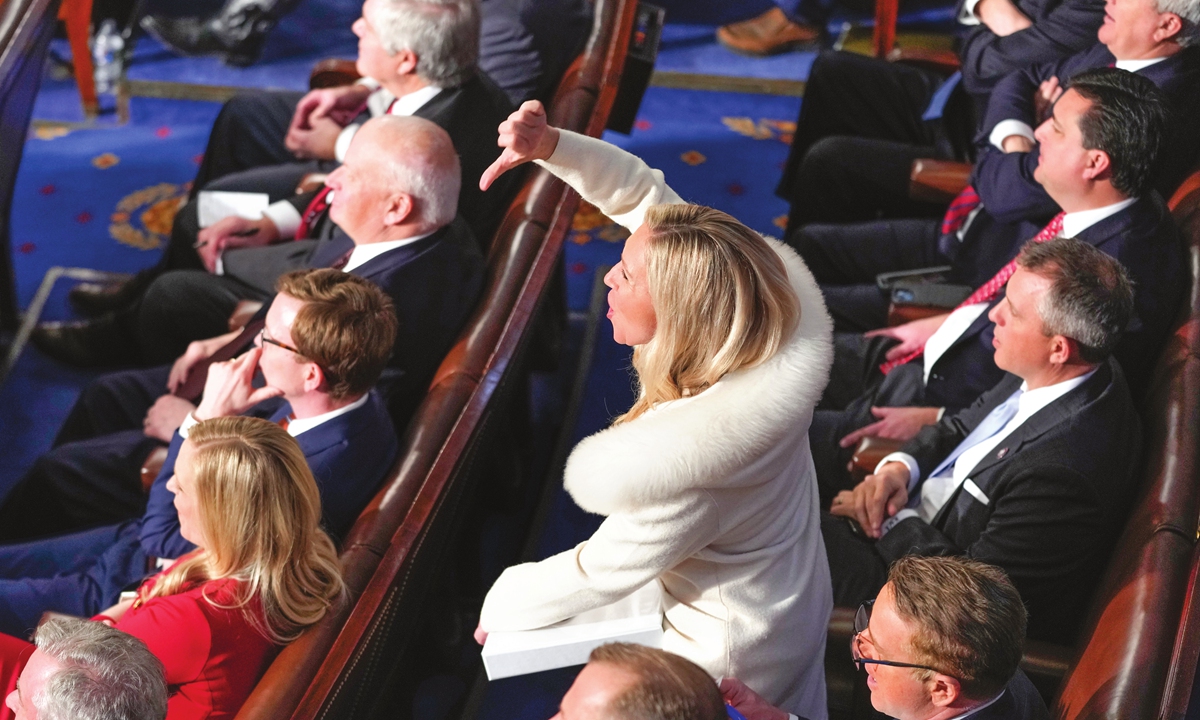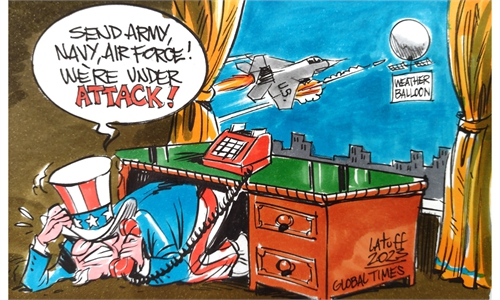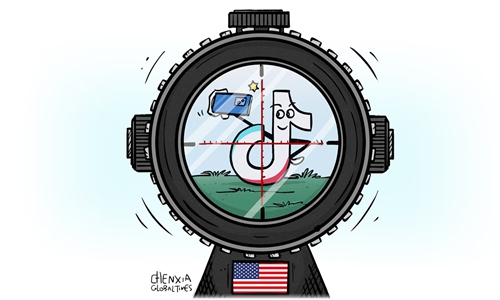
Republican Marjorie Taylor Greene hushes as US President Joe Biden delivers the State of the Union address to a joint session of Congress at the US Capitol on local time February 7, 2023, in Washington. Photo: VCG
US President Joe Biden gave his second State of the Union address with the purpose to unite the country but apparently failed as his touting of his own accomplishments received heckling from the Republicans, highlighting fraught political divisions amid the looming economic recession. The increasing reference to China in the address may also hint bumpier bilateral relations ahead with polarized political atmosphere in Washington and fiercer political struggle as the election cycle nears, analysts said.
Starting with congratulations to new House Speaker Kevin McCarthy, Biden, in his more-than-70-minute address, talked about US job growth, his infrastructure program, the rise in domestic manufacturing, the Russia-Ukraine conflict, oil dependency and America's strategic competition with China, US media reported.
The Tuesday address was different from the previous one with newly empowered GOP lawmakers in the chamber sometimes shouting criticism at him, media reported.
The State of the Union speech, on the whole, is Biden's self-promotion. Covering medical care, education, employment, gun crimes and the economy, Biden wanted to tout his "accomplishments" that had never been made by his predecessors, Li Haidong, a professor at the Institute of International Relations at the China Foreign Affairs University, told the Global Times.
The message that Biden's team wanted to convey to voters is choosing Biden to secure a democratic and better-guaranteed future. Although Biden attempted to paint a rosy picture to Americans, many of his ambitious plans, such as bringing back manufacturing, are facing various difficulties, said Li.
The optimism in his speech failed to reflect Americans' increasing worries. Biden trumpeted his handling of US economy with decades-low unemployment and slowing inflation rates but the full picture is far more complicated with a decades-high inflation, predictions of a recession and a looming battle over paying the debt, analysts said.
A Washington Post-ABC News poll also suggested that contrary to Biden's self-assessment for his first two years - it found 62 percent of Americans think Biden has accomplished "not very much" or "little or nothing" during his presidency.
Biden's public approval rating stands at 41 percent in a Reuters/Ipsos opinion poll that closed on Sunday, which is close to the lowest level of his presidency. Some 65 percent of Americans believe the country is on the wrong track, compared to 58 percent a year earlier.
Biden's low approval rating was not fully attributed to Biden or his administration's unadvised policies as a Republican president may not perform better due to the polarization of the US politics. It shows Americans have yet to reach a consensus on turning right or left as the country is standing at a historical crossroads, Yang Xiyu, a senior research fellow at the China Institute of International Studies, told the Global Times.
Yang warned that Biden's emphasis on revitalization of US manufacturing, infrastructure and technologies is an updated version of former president Donald Trump's "America first" and isolationism, prioritizing the US domestic needs over interests of the international community.
Such a new version of "America first" will severely impact the global industrial chains. Biden's plans noted in the address, whether they could become reality or not, raise the alarm that trade and investment liberalization enters into a phase of adjustment and uncertainty, said Yang.
Multiple rounds of heckling were heard in the House Chamber from some House Republicans during Biden's speech, especially when Biden challenged Republicans to lift the US debt ceiling and support tax policies. When Biden said "some Republicans want Social Security and Medicare to sunset," House Speaker Kevin McCarthy shook his head as many Republicans yelled "no." Some even yelled "liar," the Hill reported.
Biden's calling for unity between the Republicans and Democrats remains superficial and is more like a performance as he criticized, sometimes with harsh words, Republicans' political views, which would further widen the political split, said Li.
The division illustrated in the House Chamber on Tuesday may also hint a bumpier road for Biden to push bills including a massive infrastructure bill in the last two years in office as Republicans took control the House of Representatives, analysts said.
Increasing reference to China
Biden referred to China six times in the address, double from three times in 2022. Claiming the US intends to "seek competition, not conflict" with China, Biden also vowed to modernize the military to deter aggression and to protect US if China "threatens" its sovereignty - a reference to the latest stunt in the US concerning a Chinese civilian airship.
Some politicians, especially Republicans have been assailing the Biden administration and pushing a hard line in dealing with Beijing by lifting up voices on the "China threat" rhetoric.
Biden attempted to persuade the world that the US is still in a stronger position in competition with China, Li said. Biden's tone in the address was neither as harsh as some US media predicted earlier, nor mild - showing a limited rationality in a polarized political atmosphere in Washington.
Claiming to seek competition not conflict with China, American political elites should realize that the US' decline is rooted in itself, not China. The US is plagued by problems at home and abroad, and China is not the No.1 challenge, Yang said.
In response to Biden's remarks on China, Chinese Foreign Ministry spokesperson Mao Ning told a regular press conference on Wednesday that China has always believed that China-US relations should not be a zero-sum game where one side out-competes or thrives at the expense of the other.
China does not shy away or flinch from competition. However, we are opposed to defining the entire China-US relations by competition. It is beneath a responsible country to use competition as a pretext to smear other countries and restrain their legitimate right to development, even at the expense of global industrial and supply chains, Mao said.
Analysts said that with criticism from Republicans mounting, Biden may find it harder to fix China-US relations. China-US relations may face more pressure in different fields and fiercer competition between the two largest economies does not fit the expectation from the two peoples and the international community.



